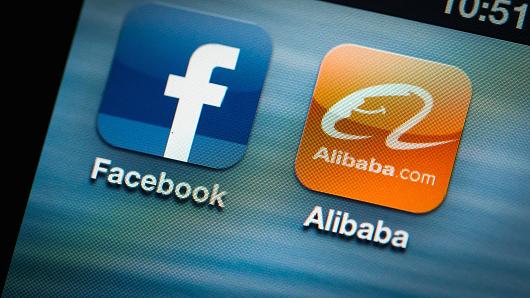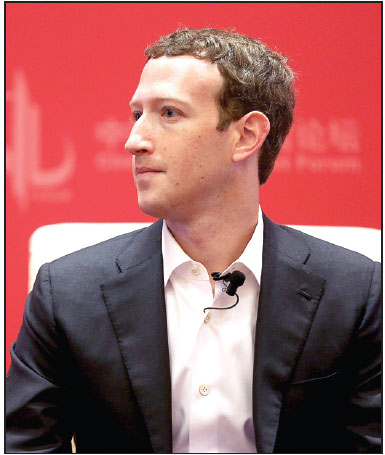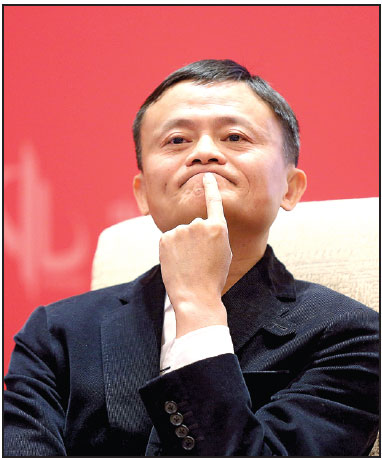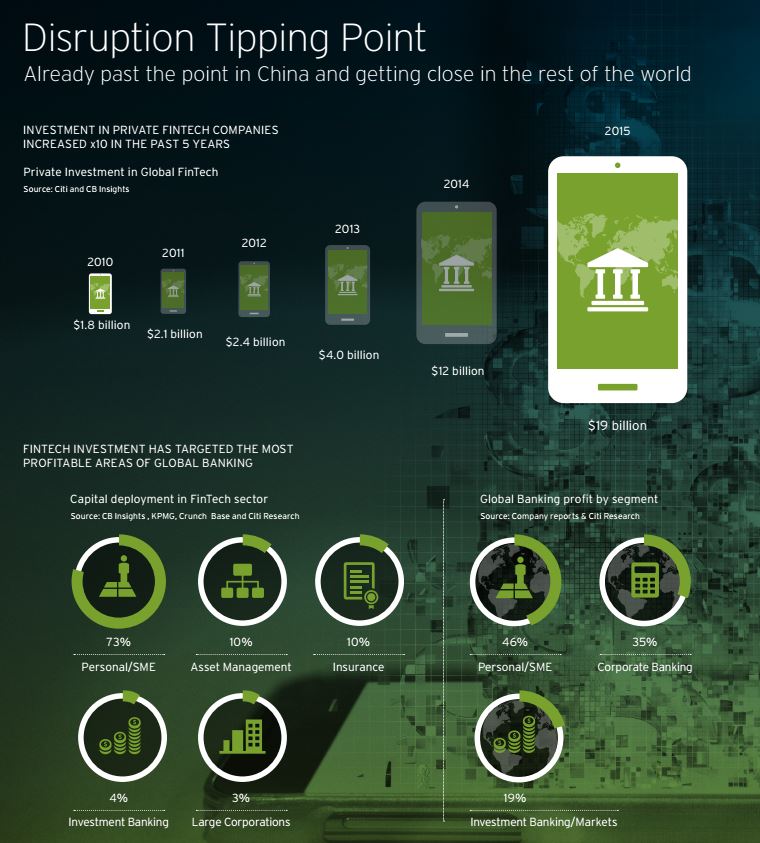
I don't always want to just repost other documents, but there are 428 pages of reports that came onto my desk this week and I think they're worth sharing. The first report is about Fintech trends (316 pages) and Money of the Future by Life.SREDA, INSEAD and Deloitte; the second is all about Digital Disruption: How FinTech is Forcing Banking to a Tipping Point (112 pages) by Citi; but, before I share those reports, here's a really interesting chat between Mark Zuckerberg (Facebook) and Jack Ma (Alibaba) that appeard in the China Daily News at the weekend. I think this is pretty interesting ...
Tech titans talk about machines, men and virtual reality
What does AlphaGo's recent victory over a world champion Go player mean to Alibaba Group Executive Chairman Jack Ma and Facebook CEO Mark Zuckerberg? "Computers will be able to process the world and understand senses like vision and hearing better than people over next five to 10 years," Zuckerberg told audience at a forum in Beijing last week. But Ma disagreed. "Machines will be stronger and smarter than human beings, but they will never be wiser," he said. "Because one thing for sure, wisdom, soul and heart are the things that human beings have and machines can never enjoy failure, success, friendship and love."
And what do they think about virtual reality, widely believed to be another big thing along with artificial intelligence? While Zuckerberg, 31, said it will be the most important computing platform in the future, Ma, 51, the former English teacher who has never received any formal training in technology, bantered: "Frankly, I don't understand most of what he was talking about."
The following are edited excerpts of the one-hour discussion between the two Internet moguls, with Qian Yingyi, dean of School of Economics and Management at Tsinghua University, as the moderator.
Moderator: A major theme of the 13th Five-Year Plan is innovation. What is innovation from your perspective?

Mark Zuckerberg, Facebook founder and CEO Reuters
Zuckerberg: I think it's to look out for five to 10 years to see what problems exist that you can take on over a long period of time. If you are solving an immediate problem today, to a lot of people it does not feel like innovation.
At Facebook, we focus on three sets of problems we want to solve over a long period:
The first is to help spread Internet connectivity, to have every person in the world have Internet. Today, with 7 billion people in the world, there are still more than 4 billion not (connected). They do not have access to all kinds of information and opportunities.
The second focus is artificial intelligence. We will have computers that can process the world and understand senses of vision and dreams, better than people. Computers may not be smarter than we are, but there will be a lot of progress in 10 years.
The third area is building the next computing platform based on VR. New computing platforms emerge every 10 or 15 years. They become more natural, immersive and can help us better interact in the world. I think the latest one will be augmented or virtual reality.
AI has attracted worldwide attention with the Go game, a game that is originated in China. What is your take on this event? What is the future of AI from your perspective?
Zuckerberg: Google deserves huge credit for their research that led to this historic win. But I think when we see these milestones of AI, we tend to think that we are very close to having general computing intelligence that can solve any problem. But the reality is that when it comes to AI today, we have one really big trick, which is large pattern recognition.
Whether it is looking at an image or recognizing what's in that. They all actually come down to the basic technology that you are looking at some data to recognize a pattern in it.
But the thing that makes humans unique today is that I think we would call it common sense or the ability to learn in one domain and then have it applied to another domain that you want to solve a problem in. So you got a computer that can play Go, but that doesn't help that computer solve other problems in other places.
Ma: I think machines will be stronger and smarter. But a machine can never be as wise as human beings.
I am a terrible Go player. When we play games, it is fun to see the other guy make mistakes. When you play with computers, they never make mistakes. It is not fun at all.
One thing for sure, wisdom, soul and heart are things that human beings have and machines can never enjoy failure, success, friendship and love. So I don't think we should be scared about machines. Instead, we should use machines as an innovative, effective way to solve problems.
How do you see the future of VR?
Zuckerberg: The idea is that VR can produce an immersive, 360-degree digital experience. For instance, recently we had a demo at Facebook where you can put on a headset, move around and play a game with someone else in another room but it feels like he is there. But then when you change the headset and then you play ping pong with another person in another room somewhere.
VR is really helpful for entertainment, education and helping people simulate different environments. The first application is going to be gaming.
I think 2016 will be a really good year for VR to start to ship. In the beginning, the market is small and there will be five to 10 years before it become a really big thing. But if you want to start with shipping something, and let a lot of people enjoy it, I think it is going to be 2016.
Ma: Frankly, I don't understand most of what Mark was saying. I believe a lot of people here don't understand it too. But I remember when I started my Internet business in 1994, I had no idea of what Internet was. What I was thinking was how this tech would help others do things easier. Similarly, when I think of VR, I ponder over how can the tech make it easier for women and girls to shop on our site and how can it help people better sell things online.

Jack Ma, executive chairman of Alibaba Group Holding Ltd
What is the most surprising innovation you've seen? What technology will change the world in future?
Zuckerberg: Google's AlphaGo is the most surprising innovation I have seen this year, because experts in the field have thought there would be a few more years before AI could defeat expert human Go players. So AI research is proceeding at a very good pace.
I got really excited about self-driving cars because they will save a lot of people's lives. There is no reason why a computer that doesn't sleep, that always pays attention, that has good memory can't drive the car better than people. It will be one of the most important advances in science over the past several decades. I also look forward to the application of AI in the science of health.
Ma: I think there will be a big breakthrough in life science in the next 20 to 30 years. People will live longer and healthier with the help of computing and data.
In the past 300 years, science was so fast and people made great progress in understanding the outside world, but we know so little about ourselves. Human beings can't decode the codes of ourselves.
I hope in 200 years there will be a law which says nobody should live more than 200 years! I have high expectation on life science.
Since both of you are bicultural, it'd be very interesting to know from both of you what're the differences between the two cultures in terms of making innovation?
Zuckerberg: One thing I'm optimistic about China is its emphasis on engineers. More of the jobs that we see everywhere around the world are increasingly technical. These are the highest-paid and most impactful jobs in a lot of places. In general, there is a huge constraint around the world on the number of good engineering students in universities. I think China gets it right by emphasizing this for a long time. When you look at the government here, lot of folks in governments are engineers. The mindset of problem solving comes from discipline.
Certainly countries all over the world are trying to train engineers, but based on my experience, it is definitely one of the things that is more emphasized in China than in other places, and I think it is a real advantage.
Ma: I once had a discussion with one of my best American friends. He said: Jack, I worry about China, because in 20 years, China's GDP will be bigger than that of the United States. You will be more powerful than the US. You are going to control the world like the Americans do.
I said: Why do you think like that way? He said: Because we think like that way. Well, this is the cultural difference.
The religion of the Western world is very competitive. They need a competitor. Either you are on my side or you are on the other side. As a company, you need to have a competitor. Whatever you do, you need to figure out what your competitors are doing.
But in China we are different. The religions of China - Taoism, Buddhism and Confucianism - are all about being harmonious. How we can change ourselves to meet the outside world. Taoism is about how can I change myself to meet the environment and Confucianism is about how can I change myself to be harmonious with the society. Buddhism is about how can I change my behavior to meet my heart or coordinate with my heart. So in the oriental culture we are not that competitive. We always try to think about how we can change ourselves to meet the others.
Three hundred years ago, all human beings, both in the West and the East, relied on philosophy and religion. But in the past 200 years we only focus on knowledge. What I feel is that the West represents more on knowledge and the East focuses more on wisdom.
So who will win? I believe those people who can blend the two cultures will win.
This is why I show great respect and love to Western culture. I believe both cultures and religions are wonderful and we should respect each other. Don't always think about how to compete, but think about how we can work together.
Both of you are entrepreneurs. Any advice to those who want to become entrepreneurs like you?
Zuckerberg: I think you should focus on solving a problem rather than starting a company. In Silicon Valley it is really cool to have a company. A lot of people start a company before they know what problem they want to solve. That is crazy. From what I can tell, most of the companies that end up achieving big missions in the world or building great enterprises start with a mission, whether it is solving a country problem or serving some customers, or creating some product to change the world. When you find your mission and have someone actually like it and use it, you will find employees to push it further to the world.
Ma: My advice is that you have to believe in what you are doing. You have a mission, you want to solve a problem and you believe it. You do it not because the others are doing it. You do it not because this thing is going to make money.
In order to do it, you are willing to sell your house and give up everything else. If you have this determination, just do it.
Currently, I am still CEO, the chief education officer, of Alibaba. My job is to ensure that people joining my company do better than me and they become better than themselves.
Internet is a technology that can improve people's lives rather than just make money. This is my belief and mission. If you have a group of people who believe in the dream you guys have together, you will be more likely to succeed.
Congratulations on your new-born daughter, Mark. I've seen a picture of you holding her with a book. The title is "Quantum Physics for Babies." Is this the starting point for learning?
Zuckerberg: What I really hope her to have is just curiosity. She should go forward and try to learn different things. It is OK no matter what she wants to be, whether a teacher, or a doctor like her mother, or an engineer like me, or anything else. I hope she has curiosity, keeps asking why things are like they are, and how things can be better. That is curiosity.
Ma: The advice to our kids is to be happier, healthier and more optimistic. I don't care what my daughter does, as long as she is happier, healthier and more optimistic at solving any problems. As human beings, we have all kinds of disasters, but we believe we will solve these problem. If we can't, someone will. If somebody can't, we can. We've been working so hard. What we want to do is to make our children live in a world better than ours.
I hope you enjoyed this interview section, now onto those Fintech reports.
This is the annual Fintech research report by Life.SREDA, the Singapore based Fintech Venture Capital Fund. The report is produced in partnership with INSEAD and Deloitte, and runs to over 310 pages. Introduced by Vladislav Solodkiy, Managing Partner of a Life.SREDA VC, he states that:
2016 will, without a doubt, be remembered as a watershed year for fintech! However, now that the dust from 2015 has settled, it's a good time to take a look at what the last year thought us. From Apple and Samsung getting into the act to Square's IPO and the rise of Asia, there has never been a better time to get into the world of financial technology. Overall, these are the 15 main takeaways I had from 2015 that I believe will still be relevant and important in 2016.
and identifies 15 key Fintech trends:
- Believe the fintech hype!
- M&A rather than IPO is the main “exit” strategy
- Asia is sexy
- MPOS acquiring
- Online acquiring
- Crowdinvesting and crowdfunding
- Blockchain
- Online lending
- Big Data and online scoring
- Payments and remittances
- Fintech for insurance companies
- Fintech for SMEs
- Bank-as-a-Service (BaaS)
- O2O (offline to online) and IoT (Internet of Things)
- The role of consulting companies in Fintech
DIGITAL DISRUPTION: How FinTech is Forcing Banking to a Tipping Point
Citi GPS (Global Perspectives & Solutions) has produced this massive tomb at 112 pages, talking about DIGITAL DISRUPTION: How FinTech is Forcing Banking to a Tipping Point. The report is introduced by Kathleen Boyle, Managing Editor, Citi GPS as follows:
When I was growing up there was a weekly ritual in our house. My Dad would bring home a check on a Thursday night and leave it under the clock on the mantelpiece. Then by hook or by crook, my Mom would make it to the local bank branch on Friday, deposit the check, get cash, and return a few dollars back under the clock for Dad for the coming week. To my Dad, the clock was the first automated teller machine.
With advances in technology, the relationship that customers have with their bank and with their finances has changed. Customers rely less and less on walking into a branch for their banking needs, and instead have digital options to help them — ATMs, on-line chat, mobile phones, and Internet banking. So far these have been seen more as additive to a customer's banking experience but when do we go over the digital disruption tipping point and see a change in the fundamental banking business?
Investments in financial technology have growth exponentially in the past decade — rising from $1.8 billion in 2010 to $19 billion in 2015 — with over 70% of this investment focusing on the "last mile" of user experience in the consumer space.
The majority of this investment has also been concentrated in the payments area and this is where banks are seeing the most competition with new entrants. Competitors already established in new marketplaces, such as PayPal for e-commerce payments in the US, or emerging in client segments traditionally underserved by banks (such as micro and small businesses) are starting to gain traction and ramp up their scale.
Despite all of the investment and continuous speculation about banks facing extinction, only about 1% of North American consumer banking revenue has migrated to new digital models. Although FinTech companies have the advantage of new innovation, incumbent financial institutions still have the upper hand in terms of scale and we have not yet reached the tipping point of digital disruption in either the
US or Europe. Given the growth in FinTech investment, this isn't likely to continue for long.
In China, Internet giants have moved into financial services and gained considerable market share in e-commerce and third-party payments. These new entrants were faster than the banks to offer convenient, reliable, fast and cost-efficient alternatives to traditional bank payments. China's FinTech companies often have as many, if not more, clients than the top banks and their FinTech players often have well-resourced parent companies in e-commerce and finance that can sustain larger and more balance sheet intensive businesses that Western venture capital funded rivals.
As customers shift their behavior and move more towards digital solutions, banks will need to rethink their digital strategy. The authors believe an omni-channel strategy is the winning solution for incumbent banks over the next decade. This should be built around a competitive digital offering, a reduced and modernized branch network, and lastly, a targeted channel strategy for different segments of customers.
I wonder if I can put a digital folder with digital money under the clock on my mobile phone?
Chris M Skinner
Chris Skinner is best known as an independent commentator on the financial markets through his blog, TheFinanser.com, as author of the bestselling book Digital Bank, and Chair of the European networking forum the Financial Services Club. He has been voted one of the most influential people in banking by The Financial Brand (as well as one of the best blogs), a FinTech Titan (Next Bank), one of the Fintech Leaders you need to follow (City AM, Deluxe and Jax Finance), as well as one of the Top 40 most influential people in financial technology by the Wall Street Journal's Financial News. To learn more click here...


